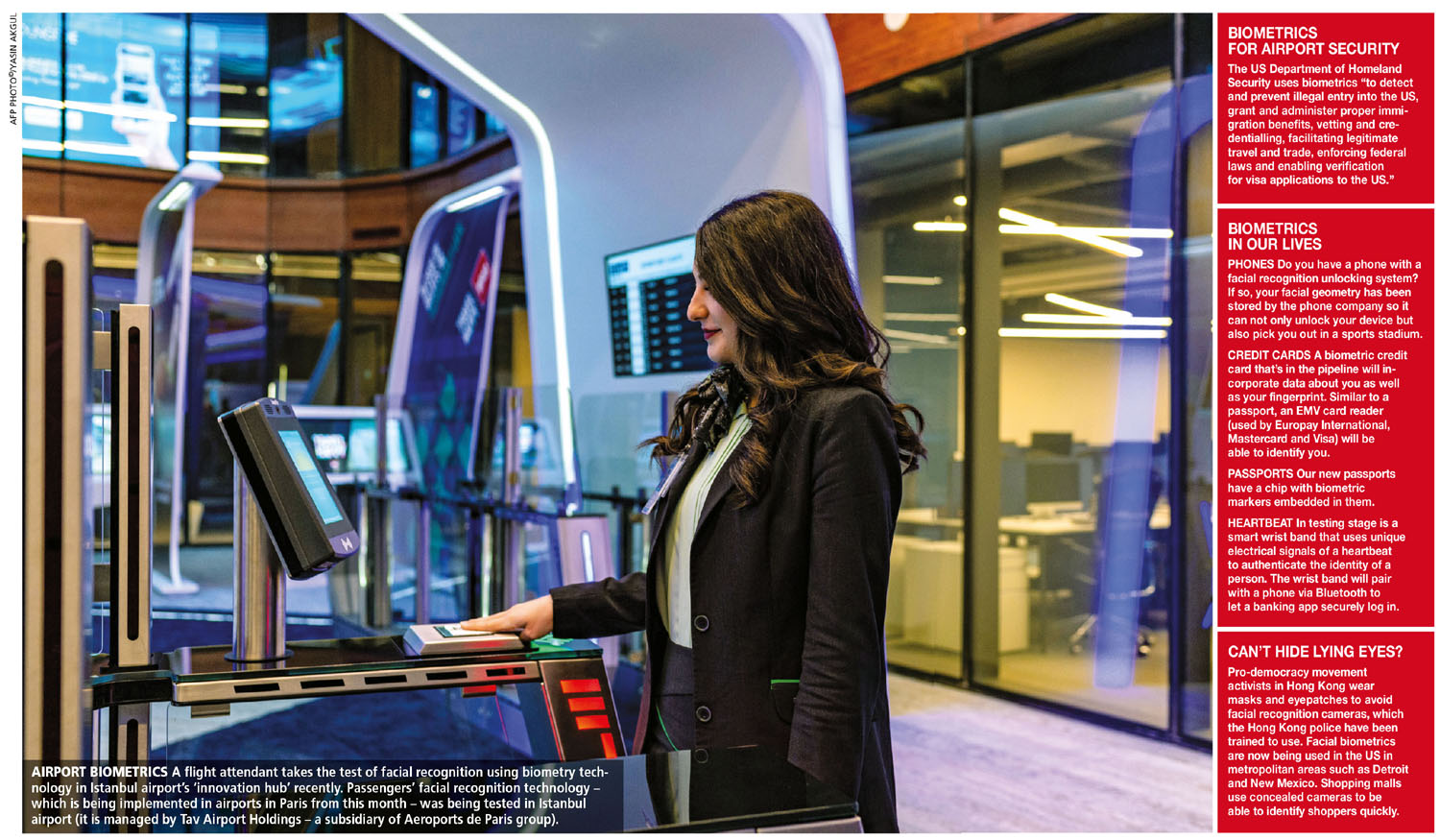BIOMETRIC BOMBSHELL
Hide your face and shield your eyes!
BY Angelo Fernando
Surveillance is no longer a pastime that’s limited to totalitarian regimes; it’s being practised by private entities that keep a watchful eye on people every day. In malls, city centres, casinos and airports, companies are tracking the biometrics of people.
 The explosion of businesses using biometrics is driven by the profits from collected data, which is traded like a commodity. But this is our data that’s surreptitiously taken from us. Combined with AI, biometrics can turn personal information – and more importantly, personally identifiable information – into a weapon.
The explosion of businesses using biometrics is driven by the profits from collected data, which is traded like a commodity. But this is our data that’s surreptitiously taken from us. Combined with AI, biometrics can turn personal information – and more importantly, personally identifiable information – into a weapon.
But before we get wrapped up in these tech labels, let’s define some of them.
Biometrics refers to biological measurements. It’s the science of measuring and analysing the specific unique physical characteristics of a person. This includes DNA, fingerprints, retina scans, voice patterns and even other physical features – such as facial geometry and the shape of a person’s ears, for example.
It then gets into deeper territory – behavioural analysis or behavioural biometrics. In lay terms, it’s the analysis of human activity patterns such as speech, gait, keystrokes, how a person uses a trackpad on a computer and navigates a site using either touch or a mouse.
Some of the data used in biometric analysis is less reliable than others but a combination of such data could be used for multi-factor data mining to quickly identify a person. This traverses the territory of artificial intelligence.
In the recent past, it was identity theft that got us all paranoid; but today, biometrics is becoming more terrifying since it’s opaque and a result
of giving companies our tacit approval to be surveilled.
It sounds so benign when a company asks us if we would like to allow a website to remember our personal data. Or when an app asks to access our address book or turn on our location for a feature to work. Because we’re always in a hurry, we click ‘OK,’ ‘allow’ or ‘accept’ – and before we know it, we’ve sold ourselves to the company store so to speak!
BREACH OF TRUST As experts warn, biometric detection is nudging closer to us than we realise.
Cybersecurity company Kaspersky explained how researchers at the University of North Carolina at Chapel Hill were able to bypass web security and download photos of 20 volunteers from social media, and use them to construct 3D models of their faces. They effectively breached four of the five security systems they tested.
Rental cars may soon come with biometric analysers and cities may use facial recognition without our knowledge as a way of assisting law enforcement through preemptive action.
Hiding our faces or making sure our children’s faces are hidden may become a necessity. Or is it too late? Millions of people (including many of you) may have uploaded hundreds of photos to leaky sneaky sites. And it’s possible that you could be part of a biometric surveillance experiment.
The New York Times published an article about
a Flickr incident where people’s family photos had been scrubbed off the photo sharing site and used to power surveillance technology.
As I’ve warned many times, these sites are free for a reason. They trade our data and metadata, gleaned from these posts and pictures without our knowledge. Think of it as an exercise in digital human trafficking where many of us have become unwilling accomplices.
The companies that build these surveillance features into their devices are almost uncontrollable. For example, Amazon sells its patented software to cities to identify people through facial scans.
DATA HARVESTING Author Shoshana Zuboff calls the business of biometrics ‘surveillance capitalism.’ It’s also the title of her book where
she describes data harvesting as a business model that “unilaterally claims human experience as free raw material for translation into behavioural data.”
In other words, information gathered from our user experiences (whether we are online or in our homes with a smart thermostat or security camera, or on the road using Google maps) is fed into what is called ‘machine intelligence.’
In 2018, Facebook admitted that its user data of approximately 87 million people had been “improperly shared” with data analysis firm Cambridge Analytica. The data grab was through what seemed like an innocuous quiz app. One of Facebook’s early investors, Roger McNamee explains the scale of this kind of surveillance that other tech companies also use.
McNamee says that users are rewarded for sharing and networking by being tracked across the internet even after they’ve logged out. They’re “strip-mined by a complicated artificial intelligence trained to sort surveilled information into approximately 29,000 predictive data points, which are then made available to advertisers and other third parties,” he reveals.
So where do we go from here? Do we actively resist this new form of capitalism by uninstalling the apps that track us but provide convenience? Or do we play along?
Biometrics has become a new currency where the wealth doesn’t trickle down to us.




